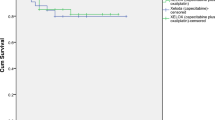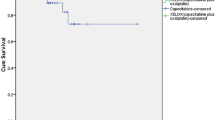Abstract
Introduction
To assess pathologic complete response, sphincter preservation rates and toxicity profile of preoperative chemoradiation with capecitabine in resectable locally advanced rectal cancer.
Materials and methods
Fifty-eight patients from six Spanish centers were included (March 2004 to June 2005) with histological/cytological diagnosis of locally advanced rectal cancer, age between 18 and 80 years, ECOG 0–2, adequate bone marrow, renal and hepatic functions. Prior chemotherapy/radiotherapy was not allowed. Preoperative treatment was capecitabine 825 mg/m2 bid concomitant to radiotherapy (45 + 5.4 Gy boost over 5.5 weeks). Surgery was performed 4–8 weeks after completion of chemoradiotherapy.
Results
Fifty-eight patients were enrolled in this study: 60.3 % males, median age of 64.5 (30.9–78.7) years, 28.6 % with ECOG 0 and 71.4 % with ECOG 1. Median distance of tumor from the anal verge was 7 (1–12) cm. Fifty-two (89.6. %) patients completed preoperative chemoradiotherapy. Primary tumor and node downstaging occurred in 61.1 and 69.6 % of patients, respectively. Surgery was performed in 55 patients (94.8 %): 80 % had negative lymph nodes and 72.7 % underwent sphincter-preserving procedures. A pathologic complete response was observed in 10.5 % (95 % CI 2.5–18.5) of the patients. Main grade I–II toxicities were leucopenia (43.1 %), neutropenia (24.1 %), anemia (36.2 %), diarrhea (32.8 %) and skin disorders (5.1 %), from which diarrhea (6.9 %), leucopenia (1.7 %) and skin disorders (1.7 %) reached grade III. There were no grade IV toxicities.
Conclusions
Preoperative capecitabine-based chemoradiation is a well-tolerated and effective neoadjuvant treatment for locally advanced rectal cancer that achieves encouraging rates of tumor downstaging.

Similar content being viewed by others
References
Krook JE, Moertel CG, Gunderson LL (1991) Effective surgical adjuvant therapy for high-risk rectal carcinoma. N Engl J Med 324:709–715
Sauer R, Becker H, Hohenberger W, Rödel C et al, German Rectal Cancer Study Group (2004) Preoperative versus postoperative chemoradiotherapy for rectal cancer. N Engl J Med 351:1731–1740
Glynne-Jones R, Harrison M (2007) Locally advanced rectal cancer: what is the evidence for induction chemoradiation? Oncologist 12:1309–1318
Piedbois P, Rougier P, Buyse M et al (1998) Efficacy of intravenous continuous infusion of fluorouracil compared with bolus administration in advanced colorectal cancer. Meta-analysis group in cancer. J Clin Oncol 16:301–308
Van Cutsem E, Cunningham D, Hoff PM et al (2001) Thymidine phosphorylase (TP) activation: convenience through innovation. Oncologist 6(suppl 4):1–2
Van Cutsem E, Twelves C, Cassidy J et al (2001) Oral capecitabine compared with intravenous fluorouracil plus leucovorin in patients with metastatic colorectal cancer: results of a large phase III study. J Clin Oncol 19:4097–4106
Liu G, Franssen E, Fitch MI, Warner E (1997) Patient preferences for oral versus intravenous palliative chemotherapy. J Clin Oncol 15:5–110
Borner M, Scheithauer W, Twelves C et al (2001) Answering patients’ needs: oral alternatives to intravenous therapy. Oncologist 6(Suppl 4):6–12
Velenik V, Anderluh F, Oblak I et al (2006) Capecitabine as a radiosensitizing agent in neoadjuvant treatment of locally advanced resectable rectal cancer: prospective phase II trial. Croat Med J 47:693–700
Dunst J, Reese T, Sutter T et al (2002) Phase I trial evaluating the concurrent combination of radiotherapy and capecitabine in rectal cancer. J Clin Oncol 20:3983–3991
de las Heras M, Arias F, del Moral R, Gómez-Millán J, Wals A, Alcántara P (2006) Phase II trial of preoperative capecitabine with concurrent radiotherapy in patients with locally advanced rectal cancer. Int J Radiat Oncol Biol Phys 66(3 Supplement):S305
Sawada N, Ishikawa T, Sekiguchi F et al (1999) X-ray irradiation induces thymidine phosphorylase and enhances the efficacy of capecitabine (Xeloda) in human cancer xenografts. Clin Cancer Res 5:2948–2953
Bonnetain F, Bosset J, Gerard J (2011) An analysis of preoperative chemoradiotherapy with 5FU/leucovorin for T3-4 rectal cancer on survival in a pooled analysis of EORTC 22921 and FFCD 9203 trials. J Clin Oncol 29 (suppl;abstr 3506)
Roh MS, Yothers MJ, O’Connell et al (2011) The impact of capecitabine and oxaliplatin in the preoperative multimodality treatment in patients with carcinoma of the rectum: NSABP R-04. J Clin Oncol 29 (suppl;abstr 3503)
Hofheinz R, Wenz FK, Post A et al (2011) Capecitabine versus 5-fluorouracil-based (neo) adjuvant chemoradiotherapy (CRT) for locally advanced rectal cancer: long-term results of a randomized, phase III trial. J Clin Oncol 29 (suppl;abstract 3504)
Aschele C, Cionini L, Lonardi S et al (2011) Primary tumor response to preoperative chemoradiation with or without oxaliplatin in locally advanced rectal cancer: pathologic results of the STAR-01 randomized phase III trial. J Clin Oncol. doi:10.1200/JCO.2010.34.4911 (published online before print in May 23)
Gérard JP, Azria D, Gourgou-Bourgade S et al (2010) Comparison of two neoadjuvant chemoradiotherapy regimens for locally advanced rectal cancer: results of the phase III trial ACCORD 12/0405-Prodige 2. J Clin Oncol 28:1638–1644
Weiser MR (2011) Rectal cancer trials: no movement. J Clin Oncol. doi:10.1200/JCO.2011.35.7053 (published online before print in May 23)
Bengala C, Bettelli S, Bertolini F et al (2009) Epidermal growth factor receptor gene copy number, K-ras mutation and pathological response to preoperative cetuximab, 5-FU and radiation therapy in locally advanced rectal cancer. Ann Oncol 20:469–474
Crane CH, Eng C, Feig BW, Das P et al (2010) Phase II trial of neoadjuvant bevacizumab, capecitabine, and radiotherapy for locally advanced rectal cancer. Int J Radiat Oncol Biol Phys 76:824–830
Acknowledgments
This study was supported in part by a grant from ROCHE España. The sponsors had no role in the design and conduct of the study, in the collection, analysis, and interpretation of data or in the preparation, review, or approval of the manuscript. The authors’ work was independent of the funders. Writing and editing assistance was provided by Marta Mas (TFS Spain).
Conflict of interest
The authors declare no conflict of interest.
Author information
Authors and Affiliations
Corresponding author
Rights and permissions
About this article
Cite this article
de las Heras, M., Arias, F., del Moral-Avila, R. et al. Multicenter phase II clinical trial of preoperative capecitabine with concurrent radiotherapy in patients with locally advanced rectal cancer. Clin Transl Oncol 15, 294–299 (2013). https://doi.org/10.1007/s12094-012-0915-y
Received:
Accepted:
Published:
Issue Date:
DOI: https://doi.org/10.1007/s12094-012-0915-y




